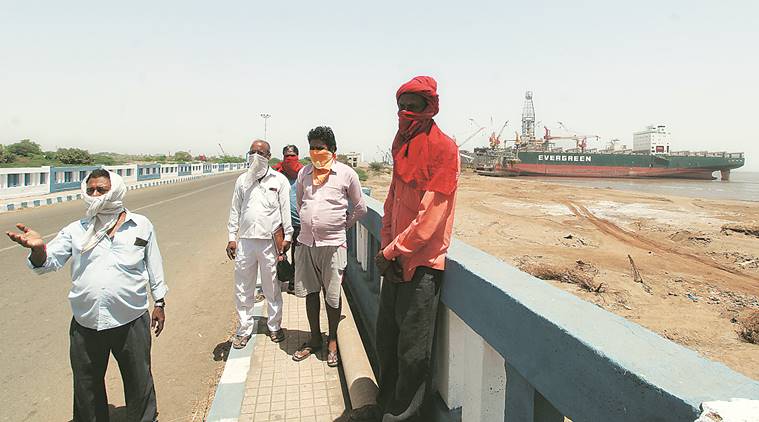- India
- International
Gujarat: No work, cash running out, workers want out of Alang
At Alang, one of the biggest ship-breaking yards in the world, migrant workers from across the country work to turn hundreds of ships, big and small, into scrap every year.
 At the shipbreaking yard in Alang in Gujarat, workers, mainly from UP and Bihar, complain that they have not been paid for March, and their money is running out. Javed Raja
At the shipbreaking yard in Alang in Gujarat, workers, mainly from UP and Bihar, complain that they have not been paid for March, and their money is running out. Javed Raja
“If Alang was Delhi, I would have fled home,” says Rajendra Chauhan, hammering nails into planks of wood stained with oil and grease.
The 49-year-old, a worker at the ship breaking yard at Alang in Gujarat, is using wood salvaged from old ships to make a cot that he can lie on, when his shanty, with its stone walls and tin roof, gets unbearably hot during the day. Anyway, there’s little work these days and most afternoons are spent thinking of home in Gorakhpur, Uttar Pradesh.
At Alang, one of the biggest ship-breaking yards in the world, migrant workers from across the country work to turn hundreds of ships, big and small, into scrap every year. Chauhan says he uses gas cutters to slice through the bodies of large ships, a work he has been doing for the last 15 years.
But the panic over coronavirus and the ensuing 21-day lockdown to check the spread of COVID-19 has brought all ship-breaking activities in Alang to a halt and left around 25,000 migrant workers, who stay along the 10-km coast in Bhavnagar district, stranded.
Giant skeletons of ships now line the greasy shore, the jaws of cranes suspended over them. Each of the half-broken ships lie within plots leased out to

ship-breaking firms, separated from the road outside by large iron gates.
These days, the workers at Alang mostly sit outside their shanties that face the sea, talking of how the “sudden” lockdown brought their lives to a standstill.
“Suddenly, the trains and buses stopped and we couldn’t leave. Walking from Alang is not an option. We can easily die on the way due to exhaustion,” says Suresh Singh, also from Gorakhpur. Alang is 50 km from the nearest city, Bhavnagar.
While some workers say they are yet to get their March salaries, others who have say they the ship breakers haven’t guaranteed work or their salaries for April.
Hari Ram, who is from Bihar and has been working at Alang for 15 years, pulls out a small wad of Rs 50 and Rs 10 notes from his pocket. “I had a debt of over Rs 4,000 which I repaid and now this is all that’s left of my March salary. I have only half a kg of rice left, some of which I ate this morning. I live alone near a Shiva temple and I now am completely dependent on Him to see me through this phase,” he says.
“What if this lockdown is extended? At least allow us to leave this place and return to our homes,” he adds.
Standing near him, Birendra Gupta, who is from Uttar Pradesh and works with one of the 75 ship breakers at Alang, says the firm is yet to pay his March salary of Rs 15,000.
“Today also, 80-90 of us went to collect our salaries but didn’t get it,” says Gupta, adding that he has Rs 40-50 left from his February salary. “When this gets exhausted, we will perhaps die of hunger. No government official comes here to check our condition. Who will we talk to or complain to?” he asks.
Captain Arun Mishra, port officer at Alang and a representative of the Gujarat Maritime Board, the state government arm that manages the shipbreaking activities at Alang, says 97 per cent of ship breakers have paid salaries for March. “There is no shortage of food at Alang and the needs of the workers are being taken care of by the plot owners,” he insists.
Haresh Parmar, a ship-breaker at Alang and honorary joint secretary of the Ship Recycling Industries Association, too, says salaries of “most workers have been paid for the month of March”. “For the last few days, we have been taking special permission from the district authorities to travel from Bhavnagar to Alang to distribute salaries,” he says.
At his small kirana shop facing the sea, Kamal Jani says there is “no shortage of supplies” but has been dealing with another trouble: workers asking for debt. “About 100 workers come regularly to buy essentials. But now, a lot of them ask if they can pay later. I know them well so I can’t even say no,” says Jani.
The message of personal hygiene and the need to wear homemade masks has reached these parts, but workers say the government could have reached out to them better.
“The government has been claiming that they are cleaning and sanitising every corner. Look at the condition here,” says Dilip Singh, a worker from Chhatral in Jharkhand, pointing to a lane lined with shanties, where he shares a 10×10 ft space with another co-worker. “All of us bathe in this lane and defecate in the ground behind. If even one of us gets infected, we are all doomed,” he adds.
May 07: Latest News
- 01
- 02
- 03
- 04
- 05






































